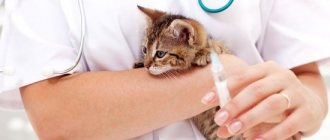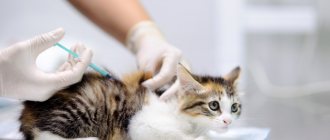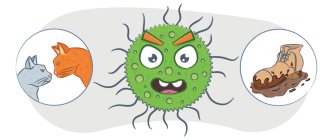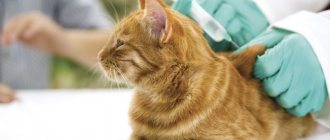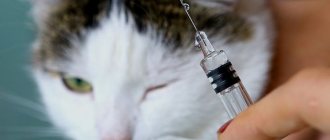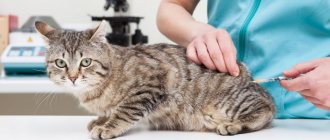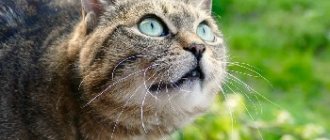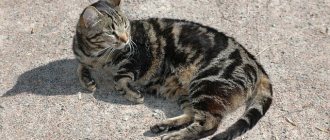June 21, 2021
In Russia, almost ten regions have introduced mandatory vaccination for certain categories of citizens who come into contact with a large number of people. Vaccinations were required for residents of Moscow, the Moscow region, Kuzbass, Tver, Tula, and Sakhalin regions. Anyone who wants to get vaccinated against coronavirus can choose from three Russian drugs: Sputnik V, EpiVacCorona or CoviVac.
“AiF-Novosibirsk” figured out how vaccines differ, what contraindications they have and their principle of action.
What vaccinations do kittens get?
Most cat owners are concerned about the question: what vaccinations should a kitten receive and whether they are mandatory.
All cat infections are extremely dangerous and are difficult for animals to tolerate. In 70% of cases, death occurs, so the baby needs to be vaccinated. Moreover, no one knows what the fate of the animal will be. Perhaps one day a pet will escape outside and come into contact with a sick representative of the fauna world.
According to the vaccination schedule, small representatives of the cat family are vaccinated against diseases that pose a serious threat to life and health.
- Leptospirosis. A dangerous infectious disease that threatens a rat-catcher or mouse-catcher, since rodents are the carriers of this infection. Owners whose pets like to walk on their own should pay attention to this disease. Basically, cats carry the infection latently (hidden), so veterinarians detect the disease at the last stage. The main signs of infection are internal and external hemorrhages (nasal/eye), fever.
- Important: Leptospirosis is transmitted to people.
- Herpesvirosis. A viral infection transmitted by airborne droplets. The disease is also popularly called rhinotracheitis. Mostly, kittens up to 7 months old suffer from herpesvirus. The disease manifests itself in the form of conjunctivitis and catarrhal lesions of the upper respiratory tract.
- Calicivirus. A disease similar to the previous one that affects young cats. It affects the respiratory organs. Symptoms include ulcers in the mouth, increased mucus in the nose, and lacrimation.
- Panleukopenia (plague). Kittens are more likely to suffer from this disease than cats. The infection is transmitted through direct contact with infected excrement or the owner's outdoor shoes that have been in plague-infected feces/soil.
Additionally, cats are vaccinated against chlamydia and leukemia if the animal is expected to participate in exhibitions, spend some time outdoors, or have contact with its feline companions.
Forms, stages of rabies
Rabies has several stages of development and occurs in cats in different forms, each of which has its own symptoms.
Forms of rabies in cats:
- Easy. The duration of the incubation period is from three to five days to 1-3 months. The animal's behavior changes. Cats become overly affectionate, annoying, and require increased attention from their owners. Attacks of affection are replaced by a state of panic. The pet is afraid of noise, sharp sounds, bright light, reacts inadequately to stimuli, and hides in secluded places. Foamy salivation, difficulty swallowing, disturbances in heart rhythm, breathing, and muscle spasms are noted.
- Violent. The most commonly diagnosed form of hydrophobia in cats. The pet shows aggression, disobedience, does not cooperate, refuses food due to spasms of the laryngeal muscles, and loses weight. The fur is tousled, dull, and falls out in clumps. The pupil does not react to light. The lower jaw droops. Saliva flows from the mouth. Anxiety gives way to complete apathy. The temperature is normal or elevated at the beginning of the development of infection or within the normal range. Paralysis of muscle structures develops, and the pet suffers from epileptic seizures. The cat dies from exhaustion, severe intoxication, and respiratory failure.
- Atypical. This form of hydrophobia is rare. The first symptoms, which are similar to manifestations of gastroenteritis (vomiting, diarrhea, high fever, loss of appetite, exhaustion, discharge from the eyes and nose) may appear 3-7 months after infection. In this condition, the cat's condition is changeable. Symptoms subside for a while, after which they appear again. The pet dies.
The first symptoms that allow you to understand that a cat is infected with the rabies virus are inappropriate behavior. If you suspect an infection, take the cat to a veterinary hospital until it is examined and an accurate diagnosis is made.
What to do if the vaccination schedule is broken
It happens that the vaccination schedule is greatly disrupted or completely unknown. This happens if a kitten was picked up on the street, but it looks like a home, which can be judged by the presence of a collar, or if the owners simply missed the moment of re-vaccination for their pet. Here you should consult your veterinarian. The doctor will tell you how best to proceed in each specific case. Sometimes a complete repeat of the kitten vaccination schedule is required, and in some situations the doctor can make an individual decision after examining the animal.
It is important to know
If a kitten is bitten by a stray animal on the street, you should immediately contact a veterinary clinic. Perhaps the veterinarian will not wait until the time left before revaccination, but will do it on the same day. 10 days after the bite, the kitten needs to be re-examined, as the veterinarian may detect some symptoms that the owner will not even pay due attention to. In this case, the cat will be isolated from the family until the diagnosis is refuted or confirmed. Because if the disease is confirmed, it will not be possible to help the pet, but it will be necessary to protect the family from infection. Some owners are interested in how long a cat needs to be isolated? No less than 1.5 months. This is the time it will take to be sure how safe the animal will be in the family.
Of course, you need to vaccinate your cat against rabies, as this will not only protect the animal, but also its owner.
Types of cat vaccines
The following vaccines are most often used to vaccinate kittens:
- Nobivac Forcat. A multicomponent vaccine that stimulates immunity in kittens to calicivirus, panleukopenia, rhinotoacheitis and chlamydia;
- Nobivac Tricat. Triple action vaccine against calicivirus infection, rhinotracheitis and panleukopenia. The first vaccination for kittens is given at the age of 8 weeks. Revaccination (repeat vaccination) should be carried out annually;
- Nobivac Tricat. It also protects the little furry from the four main diseases listed. The first vaccination for a kitten can be given at the age of 12 weeks;
- Nobivac Rabies. This type of kitten vaccine only protects against rabies. The animal develops stable immunity 21 days after vaccination. Revaccination should be carried out annually. It is acceptable to mix Nobivak Rabies with other types of Nobivak vaccines;
- FORT DODGE FEL-O-VAX IV. This is a polyvalent vaccine - against several infections. Is inactivated. Protects the cat immediately from rhinotracheitis, panleukopenia, calicivirus and chlamydia. Approved for use in kittens over 8 weeks of age. Revaccination is carried out once a year;
- Purevax RCP. A multicomponent vaccine, which included strains of rhinotracheitis, panleukopenia and calicivirosis.
- Purevax RCPCh. Contains weakened strains of the viruses listed above. The vaccine is given at the age of 8 weeks. A month later they repeat. In the future, revaccination is indicated once a year.
- Leucorifelin. Protects the animal from viral viruses and panleukopenia. It is prohibited to administer Leucorifelin with other vaccines;
- Quadricate. Vaccination for kittens against panleukopenia, rabies and calicivirus. The kitten's immunity is formed in 2-3 weeks. Repeated vaccination is carried out every year;
- Rabizin. This drug is only for rabies. Unlike other types of vaccines, Rabizin can be administered even to pregnant cats;
- Leukocel 2. Vaccine against leukemia in cats. The vaccine is given twice. Then revaccination is carried out once a year. Kittens are vaccinated at the age of 9 weeks;
- Phelocel CVR. The drug stimulates the production of immunity against rhinotracheitis, panleukopenia and calicivirus. The vaccine looks like a porous mass of pale yellow color. Before use, it is diluted with a special solvent;
- Microderm. The vaccine allows you to protect the animal from dermatophytosis (lichen, etc.).
Important: it is worth remembering that young cats under 3 years of age, as well as old and weakened animals, are always at risk.
Vaccination calendar for cats
Cats are vaccinated according to the preventive vaccination schedule according to age. Based on individual indications, the veterinarian can adjust the timing of immunization.
Vaccination schedule for cats:
- Panleukopenia, calcivirosis, chlamydia and rhinotracheitis - vaccination at 8 weeks, revaccination at 10-12 weeks and then after 12 months every year.
- Rabies - first vaccination at 12 weeks, revaccination annually.
- Microsporia - vaccination at 8 weeks, revaccination after 2 weeks and then every year.
- Viral peritonitis - first vaccination at 16 weeks, again after 4 weeks. Revaccination annually.
Possible complications after vaccination in a kitten
Each animal's body reacts differently to the vaccine. Some pets may develop the following side effects:
- apathy and loss of appetite;
- refusal of water and even your favorite food;
- increased drowsiness;
- swelling and induration at the injection site;
- increased body temperature;
- convulsive conditions;
- pleurisy and encephalitis;
- pain at the injection site;
- change in fur color at the injection site and even hair loss;
- some changes in behavior.
Important: in very rare cases, a kitten’s body does not develop immunity to infections and viruses even after vaccination, but this is an individual characteristic of the animal.
As a rule, all non-dangerous side effects go away on their own within 1-4 days after vaccination or require symptomatic treatment. For example, allergic reactions are eliminated with antihistamines. In any case, if side effects occur, you should consult your doctor for advice.
How are cats vaccinated against rabies?
Vaccination against rabies in cats requires preliminary preparation, which includes the following activities:
- deworming 10-14 days before vaccination;
- treatment against ectoparasites;
- bathing the cat (if necessary) the day before the injection.
Important! If on the day of vaccination the cat exhibits apathy, decreased appetite or other signs of infectious diseases, then vaccination is postponed until the animal has fully recovered and recovered.
If a cat is vaccinated against rabies in a clinic on an individual basis, according to the rules, the doctor is required to measure the body temperature before injection. But when mass treatments are carried out and specialists have to vaccinate hundreds of cats against rabies per day, the owner must independently monitor the condition of his pet and inform the veterinarian about alarming symptoms.
Animals are injected with the vaccine into the muscle of the back of the thigh or subcutaneously in the area of the scapula, as indicated in the instructions for use.
All information about the drug and the date of vaccination are entered in the animal’s passport. Sometimes a vaccine label is glued into it, indicating its series, batch and shelf life.
Kitten vaccination rules
In order for the kitten to be vaccinated correctly, you should follow the recommendations.
- Vaccination is not given to kittens younger than 8 weeks.
- Only a completely healthy animal without obvious signs of illness is vaccinated, and it is forbidden to vaccinate a cat if there is a suspicion that it has been in contact with a sick animal. The best solution would be to wait a couple of weeks.
- Before administering the vaccination, the veterinarian must assess the baby’s health status according to several criteria - body temperature, vigor, condition of mucous membranes.
- It is forbidden to vaccinate a kitten for three weeks after surgery and for two to three weeks before surgery.
- You should not send your pet for vaccination after antibiotic treatment. The baby’s body is weakened and even microstrains of the pathogen can provoke serious consequences. After antibiotic therapy, it is better to wait a month.
- Before vaccination, three weeks before the procedure, the animal must be dewormed.
- It is forbidden to vaccinate a cat during the period of teeth change.
- The kitten should be in a relatively calm state during vaccination. Stress and tearing out of your hands are unacceptable.
- Keep an eye on the expiration date of the vaccine if you buy it at a veterinary pharmacy. An expired drug will not benefit your pet.
Preparing for vaccination
The animal must be properly prepared for vaccination and revaccination. Preparing for vaccination involves following certain rules:
- Protect your pet from stress, drafts, overheating, hypothermia, and other negative factors that weaken the body.
- If a rabies vaccine is being administered to a pet for the first time, owners should limit the cat's contact with other animals that may be potential virus carriers. If your cat walks outside, do not let him go for walks until he is vaccinated. This will avoid possible infection from other animals.
- Keep your house and apartment clean, and also pay attention to your pet’s hygiene.
- Before vaccination, two weeks before vaccination, the cat is driven away from worms with complex anthelmintics and treated with insecticidal and acaricidal agents against ectoparasites.
Two to three days before vaccination, monitor your pet’s condition, measure its temperature twice a day, recording the readings in a notebook.
If vaccination is scheduled for the morning, do not feed your pet, but do not limit it to water. If the cat is vaccinated in the afternoon, you can give light food (half a serving) in the morning. Before vaccination, a comprehensive examination of the animal is carried out.
Where is it better to vaccinate a kitten - at home or in a clinic?
Each cat owner forms the answer to this question for himself due to his financial solvency - some can afford to invite a veterinarian to their home, while others find it easier to take their pet to the clinic. But in any case, the vaccine should only be administered by a qualified doctor.
Advantages of vaccinating a kitten at home:
- you do not transport the animal to the hospital, and as a result, the kitten remains calm at the time of the doctor’s visit;
- the veterinarian has the opportunity to assess the true condition of the pet in its usual environment. When visiting the clinic, the kitten often becomes nervous, anxious, and screams, which interferes with the doctor’s normal work;
- the cat does not have contact with the street and other furry visitors to the veterinary clinic. Due to this, the risk of contracting an infection is significantly reduced;
- you don't waste time going to the hospital.
Advantages of vaccination in the clinic:
- the doctor has at hand all the necessary equipment and tools for a high-quality examination of the animal and vaccination;
- the vaccine is constantly refrigerated before its use, as required by the rules for using the drug. The fact is that the vaccine must be stored and transported only in cold conditions. In case of a home visit, the doctor must bring the drug in a special portable refrigerator;
- if necessary, in a clinic setting, you can immediately carry out any other necessary manipulations, without waiting to visit the hospital. For example, a veterinarian may identify a tick or other problems in a kitten that require immediate attention.
And remember that the veterinarian is the first friend and comrade for your pet after you. He knows exactly how to help a kitten survive the terrible moment of vaccination. For a child, vaccination is stressful, but for an experienced doctor it is a standard procedure, so trust your pet in the hands of a professional and constantly take care of his health. Only in such conditions will the kitten grow up healthy and live a long, happy life, giving you many bright moments!

